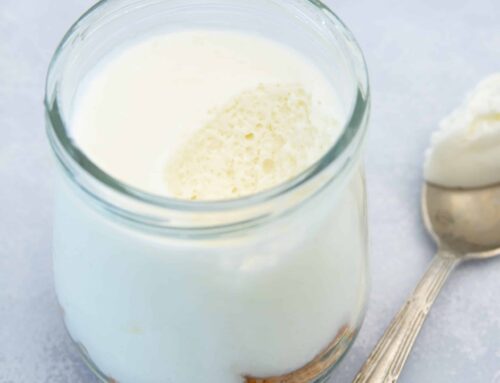The Skyr Trend: Lifting the Lid on an Established Icelandic Tradition
In recent years, skyr has enjoyed an increased presence on supermarket shelves. As a result, this product has boosted the revenue of numerous established dairy and yoghurt-producing brands and has become something of a viral phenomenon on various social media platforms and health and nutrition blogs. Skyr is a trend that looks set to stay. In this article, we’ll tell you what skyr is, who is consuming the product, and what benefits it offers over alternative products.
What is Skyr and who are the main target consumers?
The traditional methods used to make the fermented dairy product skyr date back centuries, with evidence recorded of it being produced by settlers in Iceland as far back as the 1100s. It took until the 1960s before skyr made its way to the rest of Europe, eventually arriving across the Atlantic, in America and beyond. Most often seen in small containers in the dairy aisle, there are some key differences between skyr and ordinary yoghurt…
Only slightly higher in calories, yet boasting almost twice the protein, skyr also has a thicker and creamier texture than ordinary low-fat yoghurt. This comes down to the cultures used and the quantity of milk that is reduced during the manufacturing process. Icelandic heirloom cultures, preserved and passed down through generations, are added to heated skimmed milk.
A staple breakfast and snack food in Iceland for centuries, recent years have seen this rich dairy product spread throughout Europe and the world. It has been lauded for its beneficial properties by dieters, healthy eaters, and fitness enthusiasts alike. So, what are the nutritional and health benefits of skyr, and how is it different – or perhaps even superior – to ordinary yoghurt?
Health benefits of skyr at a glance
The closest comparison to skyr that can be found next to it on supermarket shelves is Greek yoghurt. Greek yoghurt is produced by straining ordinary yoghurt to remove surplus whey. The result is a thicker, more concentrated yoghurt, which is also higher in protein than traditional yoghurt.
Naturally low in fat, yet high in protein, it is unsurprisingly of great appeal to fitness enthusiasts seeking healthy sources of natural protein. Meanwhile, dieters also appreciate its high satiation value. However, alongside its muscle-building and appetite-inhibiting properties, skyr also contains a host of valuable nutrients and health benefits:
- Studies have shown that protein from dairy products can regulate blood sugar, improve bone health, and help preserve muscle mass during weight loss[1]
- Skyr is high in calcium (a 150 g single-portion pot contains approx. 15% of an adult’s recommended daily intake), which increases bone strength and can protect against osteoporosis
- Skyr is low in fat and sugar and contains no added sugar
- Skyr is high in potassium (approx. 6% daily intake per portion), magnesium, and phosphorus, all of which are important for bone strength and cardiac health. Dairy products have also been shown to reduce blood pressure. This further reduces the risk of a heart attack.
- An individual (150 g) portion of skyr contains around 19% of an adult’s recommended daily intake of vitamin B2 (riboflavin). This vitamin has been credited with reducing oxidative stress and the inflammation of the nerves. At the same time, it promotes normal brain activity and reduces the effects of migraines. It has also been suggested that riboflavin may reduce the risk of cardiovascular disease[i]
A matter of culture: skyr as a contributor to good gut health
Central to what makes skyr unique, and key to the nutritional value of this on-trend dairy product, are its distinctive Icelandic live bacterial cultures; also known as probiotics. Supporting the work of your digestive enzymes in breaking down food, probiotics are believed to “help restore the natural balance of bacteria in your gut” (including your stomach and intestines) which can be disrupted as the result of an illness.
Some evidence exists that probiotics may help treat some medical conditions, such as helping to ease symptoms of irritable bowel syndrome (IBS).[ii] IBS has been estimated to affect around 10-15% of the European population[iii], which explains the marked increase in the size of the probiotics market, both in Europe and globally. In 2022, the global market for probiotics was valued at more than $2.5 billion, with forecasts predicting an increase of 8% CAGR over the next ten years[iv]. Bacteria such as Streptococcus thermophilus and Lactobacillus delbrueckii subsp. bulgaricus play a key role in the fermentation of skyr. However, what makes skyr unique is the use of yeast during the fermentation process and the presence of rennet. This complex mix of enzymes assists with the digestion of cow’s milk (although not all manufacturers still include this ingredient).
Another benefit of both skyr and Greek or traditional yoghurt is their reduced lactose content, with 90% of the lactose removed due to the withdrawal of whey protein. As a result, skyr is fairly well tolerated by consumers with mild lactose intolerance. The global lactose-free dairy market size was valued at $11.45 billion in 2021 and is projected to reach $24.36 billion by 2031[v]. This increase in demand serves as evidence of a rise in lactose intolerance, representing yet another argument in favour of adding skyr to your product portfolio.
Skyr: an in-vogue culinary ingredient
In addition to skyr’s health benefits and use as a low-calorie aid to weight loss, this Nordic speciality is also building a reputation as a gastronomic and stylish alternative to traditional yoghurt.
A gastronomic product
This is not least on account of its rich and creamy texture. There is no better advertisement for the appeal and versatility of skyr as a culinary ingredient than its extensive use by Michelin-star Icelandic chef, Agnar Sverrison. Known more familiarly as Aggi, the chef draws inspiration from his Icelandic roots, using skyr in dishes ranging from barley dip to ice creams and baked skyr parfait[vi]. When at home, he likes to keep things a little simpler; pairing the delicious dairy product with fresh fruit or muesli for a healthy, high-protein breakfast.
This cultured Icelandic yoghurt is therefore incredibly versatile, whether you are a seasoned chef keen to experiment with new textures and flavours, or a healthy eating enthusiast searching for a substitute for cream, butter, or other less healthy dairy products.
This enthusiasm for healthy products that can be integrated into different recipes represents a viable route to market for producers of dairy products. In some countries, skyr is already available off the shelf as a mousse, for example in Norway. The versatility of this product means that, in many countries, areas of the market remain untapped.
Appealing to the health-conscious consumer with clean products, and clean labelling
Modern consumers are now extremely ‘label aware’. The desire to increase nutrient intake while avoiding added sugar has an ever-growing impact on the purchase decision. Furthermore, consumers are rejecting chemical ingredients such as E-additives. This is where the “clean label” comes into play. Although there is no official certification or logo, the Clean Label is becoming established within the agri-foods industry as a means to demonstrate that the selection of ingredients and production methods have been adapted to fulfil certain criteria:
- The avoidance of unnecessary additives and preservatives
- Respect for the environment
- Fair payment to producers
- Animal welfare
- Transparency for the consumer regarding ingredients, production methods, product origin etc.
Participation in the clean label scheme is voluntary, however, it is becoming an established trend. As a producer of dairy proteins, we can supply skyr-compatible products that will help you to adhere to clean label values without compromising on product quality. Our proteins can help you produce products that are ‘clean’ and yet do not compromise on flavour or texture. They also tick every box with regard to ethical production. We work with local family farms, meaning we can monitor breeding and grazing practices. Furthermore, our proteins are mechanically extracted. This avoids the use of chemicals in line with consumer expectations. The dairy industry is evolving, and Ingredia Proteins can make sure that you don’t get left behind.
High added-value proteins such as Promilk® could help improve recipes.
Sources
[1] https://www.ncbi.nlm.nih.gov/pmc/articles/PMC3703276/
[i] https://www.hsph.harvard.edu/nutritionsource/riboflavin-vitamin-b2/#:~:text=Riboflavin%20works%20to%20reduce%20oxidative,mitochondrial%20abnormalities%20in%20the%20brain.
[ii] https://www.nhs.uk/conditions/probiotics/#:~:text=Probiotics%20are%20thought%20to%20help,irritable%20bowel%20syndrome%20(IBS).
[iii] https://pubmed.ncbi.nlm.nih.gov/16807154/#:~:text=Irritable%20bowel%20syndrome%20affects%20approximately,and%20diagnosis%20of%20the%20condition.
[iv] https://www.gminsights.com/industry-analysis/probiotics-market?gclid=CjwKCAjwxr2iBhBJEiwAdXECwyaFpKxCSWQlo9mK1GO-gjb2L1Tznc7FHTlA295KyoJJ4dmNyR1yNxoCasoQAvD_BwE
[v] https://www.alliedmarketresearch.com/lactose-free-dairy-market-A18453#:~:text=The%20global%20lactose%2Dfree%20dairy,8%25%20from%202022%20to%202031.
[vi] https://www.thehandbook.com/blog/2018/12/the-handbook-meets-aggi-sverrisson-patron-chef-of-the-michelin-starred-texture/


